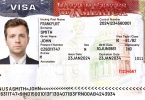The H-1B visa has long been the go-to option for skilled international workers seeking employment in the United States. However, with increasing scrutiny, uncertainty, and the return of Donald Trump as U.S. President, many foreign professionals are exploring alternative work visa options.
The H-1B visa lottery system, with its capped annual quotas and rising rejection rates, has made it imperative for skilled workers and employers to consider other pathways to legally work in the U.S.
This investigative report examines alternative visa categories such as H-2A, H-2B, H-3, L, O, P, Q, and R visas—each offering unique opportunities for international professionals, seasonal workers, trainees, and specialized experts.
Apply Also: Care Support Worker Jobs in USA with Visa Sponsorship…
L-1 Visa: Intra-Company Transfers
The L-1 visa enables multinational companies to transfer executives, managers, and employees with specialized knowledge to their U.S. offices. The L-1A visa is for managers and executives, while the L-1B visa is for specialized knowledge employees. It is often a preferred alternative for tech professionals who fail to secure an H-1B visa.
- Difficulty Level Compared to H-1B: Easier in terms of approval rates but restricted to multinational employees.
- Pros: No annual cap, and dual-intent visa allows for a transition to a Green Card.
- Cons: Requires employment with the same company for at least one year and limited to company transfers only.
- Apply: L-1 Visa Application
H-2A Visa: Agricultural Workers’ Entry Point
The H-2A visa is a temporary work permit for foreign agricultural workers. Employers in industries like farming, livestock, and nurseries rely heavily on this visa to meet seasonal labor shortages. The H-2A visa has no numerical cap and allows workers to stay for up to three years. However, the program is employer-sponsored and requires proof that no U.S. workers are available to fill the roles.
- Difficulty Level Compared to H-1B: Easier due to no annual cap but restricted to agricultural jobs.
- Pros: No annual cap on visas issued, and pathway to extended employment if the employer continues to need labor.
- Cons: Restricted to agricultural jobs, and no direct path to a Green Card.
- Apply: H-2A Visa Application
Apply Also: H1b Visa Sponsorship Jobs in USA
P Visa: Athletes, Artists, and Entertainers
The P visa covers internationally recognized athletes, entertainers, and performers. It is divided into P-1 (individuals or teams of athletes), P-2 (artists performing under reciprocal exchange programs), and P-3 (artists in culturally unique programs).
- Difficulty Level Compared to H-1B: Easier for qualified individuals but limited to specific industries.
- Pros: Ideal for entertainers, performers, and sports professionals, and can extend stay based on contract duration.
- Cons: Must demonstrate international recognition, and employer sponsorship required.
- Apply: P Visa Application
H-3 Visa: Training and Special Education Exchange
The H-3 visa is designed for trainees and special education exchange visitors. This visa allows foreign nationals to receive training in the U.S. that is unavailable in their home country. Common industries include aviation, medical research, finance, and engineering.
- Difficulty Level Compared to H-1B: Easier but lacks work authorization beyond training.
- Pros: No cap on the number of visas issued, and this visa option can lead to professional experience in the U.S.
- Cons: No work authorization outside training scope and cannot be used for graduate medical training.
- Apply: H-3 Visa Application
Apply Also: How to Apply for a Schlumberger Internship
R Visa: Religious Workers
The R visa is designated for religious workers entering the U.S. to work in religious vocations or as members of a recognized denomination. It allows individuals to work in churches, mosques, synagogues, or non-profit religious organizations.
- Difficulty Level Compared to H-1B: Easier but restricted to religious work.
- Pros: Dual-intent visa with Green Card potential and no numerical cap.
- Cons: Requires sponsorship by a religious organization and employment must be in a religious capacity.
- Apply: R Visa Application
Q Visa: International Cultural Exchange Program
The Q visa is similar to the J-1 visa and is intended for cultural exchange programs that promote the sharing of international traditions, art, and history. It is often used for cultural instructors and museum professionals.
- Difficulty Level Compared to H-1B: Easier but limited to cultural exchange programs.
- Pros: Open to individuals from diverse cultural fields and encourages cross-cultural exposure.
- Cons: Limited to designated exchange programs and no long-term employment pathway.
- Apply: Q Visa Application
Apply Also: How to Become an Immigration Lawyer in USA
O Visa: Individuals with Extraordinary Ability
The O-1 visa is for individuals with extraordinary ability in science, arts, education, business, or athletics. It is often used by researchers, scientists, artists, and athletes. O-2 visas are for support staff assisting O-1 holders.
- Difficulty Level Compared to H-1B: More difficult due to high documentation requirements.
- Pros: No annual cap and offers a direct pathway for distinguished professionals.
- Cons: Requires extensive documentation of extraordinary ability and not a long-term work visa.
- Apply: O Visa Application
H-2B Visa: Seasonal Non-Agricultural Jobs
The H-2B visa caters to temporary non-agricultural workers, covering industries such as hospitality, landscaping, construction, and food processing. It is highly competitive due to its annual cap of 66,000 visas. The demand often exceeds supply, making early application crucial.
- Difficulty Level Compared to H-1B: Similar, due to high demand and annual cap.
- Pros: Covers various job sectors outside agriculture and renewable for up to three years.
- Cons: Annual cap limits availability and no direct path to permanent residence.
- Apply: H-2B Visa Application
Apply Also: Laboratory Assistant Jobs in USA with Visa Sponsorship…
Conclusion
While the H-1B visa remains a popular option for skilled workers, the alternatives listed above provide viable pathways for individuals and employers navigating the complexities of U.S. immigration policies. Each visa category has its own pros and cons, and the best choice depends on your specific circumstances, qualifications, and career goals.
Additional Tips for Success
- Consult an Immigration Attorney: Visa applications can be complex, and professional guidance can improve your chances of approval.
- Prepare Thorough Documentation: Ensure all required documents are accurate and complete to avoid delays or rejections.
- Stay Updated: Immigration policies can change, so stay informed about the latest updates and requirements.
By exploring these alternative visa options, you can find the right pathway to achieve your professional and personal goals in the United States. Good luck!






